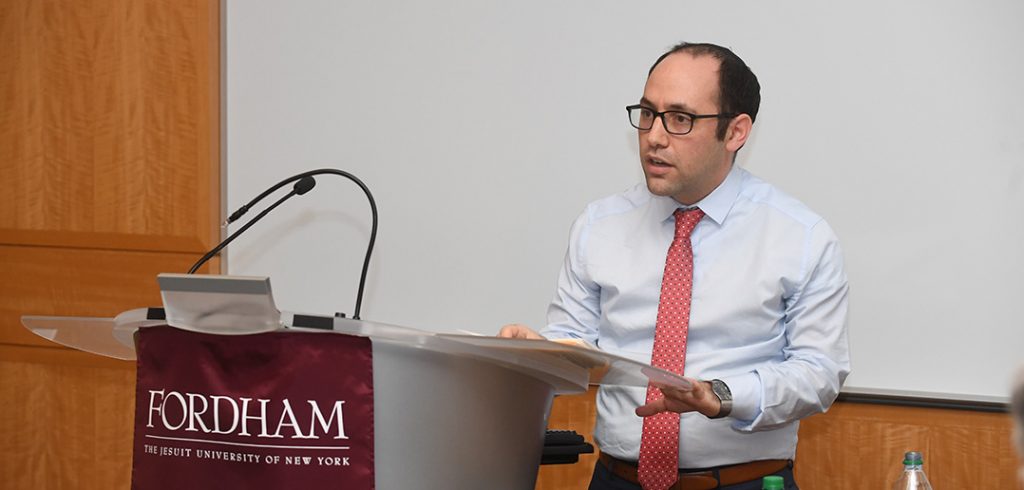In an event that marked a new academic collaboration by Fordham and Columbia Universities, Marc Herman, Ph.D., delved deep into the history of Jewish law in a Feb. 15 lecture.
Herman, the first Rabin-Shvidler Joint Post-Doctoral Fellow in Jewish Studies, delivered his talk, “Legal Theory and Revelation: Jewish Law in an Islamic Milieu,” at the Lincoln Center campus.
He explored the competing philosophies of two of the most influential Jewish jurists and philosophers of the Middle Ages, Seʿadya ben Joseph Gaon and Moses Maimonides. The two, though living in different centuries and in different locations, engaged in a raging debate about whether laws should be interpreted strictly as they were revealed in the Torah, or whether they should be open to debate by contemporary leaders (known as Rabbinic tradition). In Western terms, Seʿadya’s philosophy would be aligned with originalist thinking, while Maimonides would interpret laws as a ‘living document.’
Both men permeated their writings with contemporary Islamic legal trends.
Seʿadya, Herman said, reconciled differences in tradition by drawing on techniques developed by early Muslims. Like his Muslim contemporaries, Seʿadya suggested that disagreements among friends were not genuine disputes. Instead, they reflected temporary misunderstandings, incomplete transmission, or even a misinterpretation on the part of future scholars.
One of Seʿadya’s students, for example, proposed that in the future, a rule that Jews pray three times on weekdays, four on the Sabbath, and five on the day of atonement might be misinterpreted to mean one need only pray three times a day (regardless of the day).
For his part, Maimonides asserted that God charged each generation with a dual responsibility. First they must faithfully transmit revealed laws, such as those handed down to the Jewish people by Moses, alongside man-made norms of earlier jurists. Then they must draw on both categories to produce new norms. Early scholars of Islam were likewise debating the words that Muhammad had received and had written in the Koran.
“Maimonides defined this activity as Qiyas, using the exact Arabic term that Seʿadya had associated with improper derivations from divine law [that Seʿadya had]associated with charism,” Herman said.
To Seʿadya, the Talmud constituted received tradition; to Maimonides, it was meant to be a subject of debate.
Some of the two jurist’s differences undoubtedly stemmed from the eras they lived in, said Herman. Seʿadya lived from 882-942 C.E. in Baghdad, where he headed an ancient Jewish academy, while Maimonides lived from 1138-1204 C.E. Each of them would have been influenced by their institutional positions, too. Given Seʿadya’s position in Baghdad, it is no surprise that he upheld the continuity of tradition. Conversely, Maimonides, who lived in what is now Spain, undertook to defend his independence from rabbinic authorities in Baghdad.
Both, however, would have been heavily influenced by Muhammad ibn Idrīs al-Shāfiʿī, a Palestinian-Arab Muslim theologian, writer, and scholar, who lived from 767 to 820 A.D. Shāfiʿī insisted that only revealed text, such as the Koran or certain oral traditions, constituted acceptable legal sources.
“By putting Seʿadya and Maimonides in dialogue with Islamic legal thought, we can better understand their theories on their own terms, why their assertions were compelling to them and their immediate readers, and why later readers often struggled with their ideas,” Herman said.
Herman’s fellowship was made possible by the Stanley A. and Barbara B. Rabin Postdoctoral Fellowship Fund at Columbia University and the Eugene Shvidler Gift Fund at Fordham.
Additionally, the event was a joint effort, between Fordham’s Jewish Studies program, the Institute on Religion, Law & Lawyers’ Work at Fordham School of Law and the Institute for Israel and Jewish Studies at Columbia University.
Herman was joined by Fordham faculty members Kathryn Kueny, Ph.D., professor of theology, and Jed Shugerman, professor of law, who provided responses to the talk.
For more, watch here:

